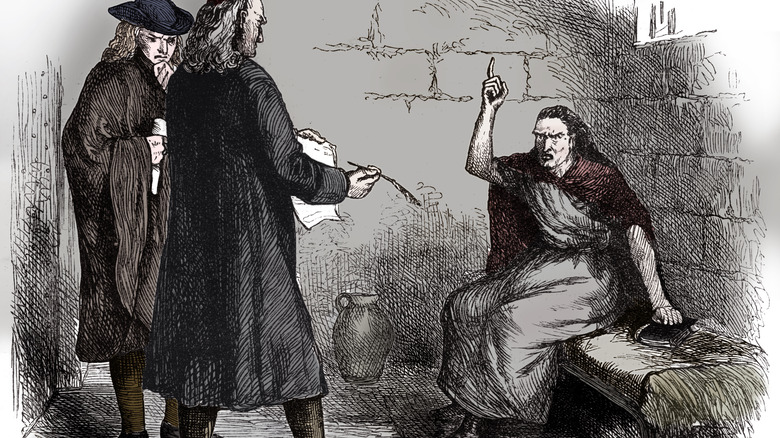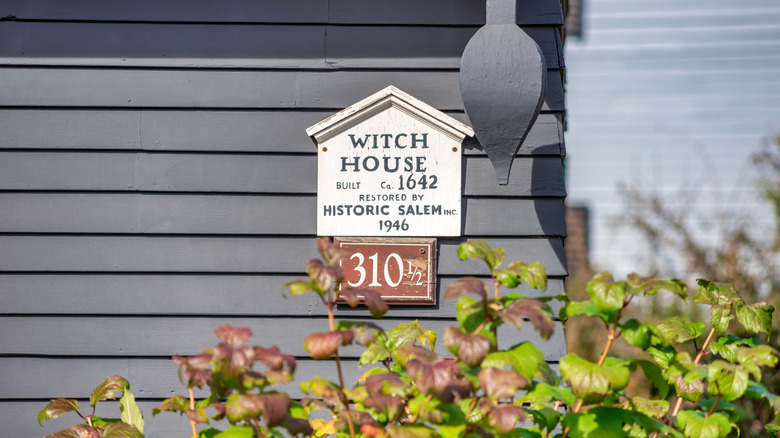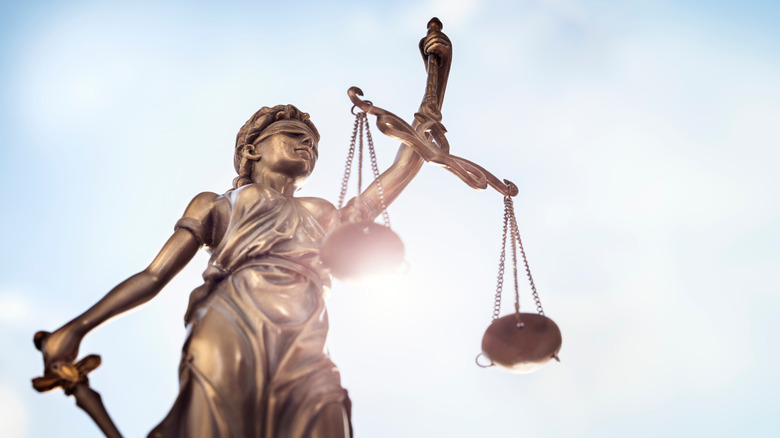How The Salem Witch Trials Impacted America's Legal System
The Salem witch trials, and the subsequent executions, were some of the darkest and most notorious events in United States history. As reported by Smithsonian Magazine, more than 200 people, mostly women, were accused of practicing witchcraft between 1692 and 1693 in colonial Massachusetts. Although the numbers are often exaggerated, a total of 20 people were ultimately sentenced to death for practicing witchcraft.
Smithsonian Magazine reports 19 of those sentenced to death were hanged on Gallows Hill and one was "pressed to death with heavy stones." Several others died in jail while awaiting trial or sentencing. However, contrary to some rumors, nobody was burned to death as a result of the Salem witch trials.
At the time, the colony had been operating without any charter, and therefore did not have an established court system. However, as reported by History, the newly appointed royal governor of Massachusetts Bay Province, William Phips, provided the colony with a new royal charter, which gave the legislature permission to establish a court structure. Unfortunately, it would take time to develop and implement a fair and just system.
When Gov. Phips arrived in the colony, the jails were already crowded with people accused of practicing witchcraft. In an attempt to expedite the process, he formed a special Court of Oyer and Terminer to hear the cases. In modern courts, the accused are assumed to be innocent until proven guilty. However, defendants in Salem's Court of Oyer and Terminer were presumed guilty.
The court was not just nor fair
As reported by History, Salem's Court of Oyer and Terminer did not protect the defendants against hearsay. University of Michigan Law School professor Len Niehoff said today's hearsay rule "prevents the admission of rumors, assumptions, and community gossip — precisely the sorts of things that drove the Salem trials."
In an interview with History, Niehoff said the defendants were also at a disadvantage, as "there were no defense lawyers present or allowed" in Salem's Court of Oyer and Terminer. In his opinion, a defense lawyer could have "very effectively challenged" a vast majority of the witnesses in the trials.
Salem's Court of Oyer and Terminer also allowed so-called "spectral evidence," to be used against the accused witches. Essentially, witnesses were permitted to testify that "the accused person's spirit or spectral shape appeared to him/her ... in a dream at the time the accused person's physical body was at another location."
History reports the court's decision to allow the admission of spectral evidence was controversial and not standard legal process. However, they continued to convict accused witches based on spectral evidence until late 1692, when the court's methods were called into question and the general public began questioning whether the trials were effective in proving whether people were practicing witchcraft.
The injustice in Salem inspired centuries of change
Salem's Court of Oyer and Terminer was ultimately dissolved by Gov. Phips on October 29, 1692. In May of the following year, Gov. Phips pardoned everyone accused of practicing witchcraft and released anyone who was incarcerated. As reported by History, In 1711, the commonwealth of Massachusetts passed legislation to exonerate those who were executed amid the Salem witch trials and ordered their families to be paid restitution.
Although the Salem witch trials caused an immense amount of unnecessary suffering, they influenced decisions about fundamental freedoms, specifically within the court system, for years to come. "The trials are filled with cautionary tales about how catastrophically bad things can go when legal proceedings fail to offer certain minimum guarantees," Niehoff said.
The fallout from the Salem witch trials is credited with encouraging the implementation of fundamental freedoms and rights guaranteed in the Bill of Rights, as well as a number of laws pertaining to court procedures and the rights that assure criminal defendants a fair trial.
As reported by History, Niehoff said the Salem witch trials "have had an immense influence on how we think about the law."


